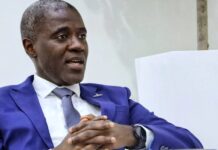NICTIB II: Fiber Optic Cable Infrastructure Brings Hope and Concerns to Communities
By Khadija Ishaq Bawas
TECHDIGEST – In the quiet neighborhood of Buhari Estate, residents are buzzing with excitement over the installation of high-speed fiber optic cables by the National Information Communications Technology Infrastructure Backbone (NICTIB II) a Galaxy Backbone Project under the supervision of the Federal Ministry of Communications and Digital Economy.
Mohammed Nasir Bello, a forex trader and cryptocurrency dealer, eagerly anticipates the potential of this new infrastructure to revolutionize their lives. Bello believes that reliable and affordable broadband services will enable him and others in the community to scale up their trade, becoming more self-reliant and tapping into the lucrative $4.5 trillion digital economy market.
“I am excited for the opportunities that this new infrastructure brings. With reliable and affordable broadband services, my fellow traders and I can expand our businesses to become more independent and take advantage of the thriving $4.5 trillion digital economy market.”
Sharing the same optimism, Abdulkadir expresses frustration over the area’s current epileptic internet connectivity. He hopes that once the fiber optic cables are installed and launched, the chronic connectivity issues will become a thing of the past. Additionally, Abdulkadir sees great potential for the new infrastructure to generate digital job opportunities, benefiting the teeming youth population in the area.
However, amid the excitement and hope, Mustapha Sulaiman, another resident of Buhari Estate, raises a concern. He voices his disappointment with the lack of proper management of the ditches dug by the laborers during the cable installation process. Sulaiman claims that this negligence has led to occasional flooding episodes, posing a threat to the safety of residents and even resulting in casualties.
“Improper sand disposal after excavating the hole is the primary challenge faced in this project. The hole gets filled with water during rainfall, which triggers complaints from individuals regarding its adverse effects on their property. Furthermore, this circumstance leads to erosion and poses a potential hazard for young children, who could slip and sustain injuries”
Sani Abulmumuni – a graduate of Public Admin and a computer intern at Resource Center says his business is mostly centered around downloads of resource material hence the fibre optic infrastructure installation is key to his gains.
The Information Communications Technology Infrastructure Backbone (NICTIB II) a project of Nigeria’s Ministry of Communication and Digital Economy through Galaxy Backbone Limited is a continuation and expansion of the initial NICTIB project, which was implemented to address the need for improved network connectivity in Nigeria. The primary objective of NICTIB II is to establish a reliable and affordable broadband infrastructure backbone that spans the entire country.
READ ALSO: NCC Plan to Deploy four More ECCs, laments Underutilization
By enhancing network connectivity, NICTIB II aims to facilitate effective communication and support the growth of various sectors, including education, healthcare, government services, and business enterprises. The project seeks to bridge the digital divide by providing access to high-speed internet services in both urban and rural areas of Nigeria.
The implementation of NICTIB II involves the deployment of fiber optic cables, satellite technology, and other advanced telecommunications infrastructure. It focuses on building a robust backbone network that connects major cities, towns, and rural areas, ensuring widespread coverage and improved internet connectivity.
In January 2022, the Federal Government said it is targeting $40billion private capital investments in digital infrastructure and facilitating the formation of up to $1 billion in private equity. The government estimates public investment of N150billion, according to National Development Plan 2021-2025.
This follows increased average funding for technology start-ups from $57,000 in 2015 to $73,000 in 2020, signalling increased investor interest in Nigeria. These achievements were driven, in part, by the government’s actions to develop a favourable enabling environment. For example, 98 per cent of the approximately 1400 Km of the National Information Communications Technology Infrastructure Backbone (NICTIB) phase 1 has been completed and is in operation across 11 states.
READ ALSO:NASENI Invites Producers of Lithium Batteries to Manufacture in Nigeria
Read Also:
Further, in 2020, the Nigerian government supported leading fibre and transmission infrastructure companies to extend coverage through the second phase of the NICTIB II project, with over 3,250 km of fibre optic cables running across the six geopolitical regions. The NICTIB II, which is being funded through a $328 million private credit facility, will provide connectivity across several towns and cities along its routes, thus facilitating access to broadband services for an estimated population of over 9.2 million people.
Dr Ali Mohammed Usman a lecturer at the Federal College of Education (FCE) Gombe and an ICT expert said the importance of this development cannot be over emphasised, stating that the era of epilptic internet supply will soon be over and citizens can leverage on Artifical Intelligence (AI) and Internet of Things (IOT) for economic prosperity.
“The use of fiber optic cables is essential for leveraging AI and IoT technologies, which are vital for economic growth. By adopting these technologies, we can unlock innovation and create new opportunities for entrepreneurs and businesses”
He also called on Galaxy backbone to priortise cyber security and and affordable service rates in the long long while providing access to computers through hubs so as to include and benefit persons with disability.
Back in September 2018, as part of former President Muhammadu Buhari’s 6-day official visit to attend the Beijing Summit of the Forum on China-Africa Cooperation (FOCAC), Nigeria and its host, China sealed a $328million agreement to develop Information and Communications Technology infrastructure in Nigeria.
Details of the agreement, according to a statement issued and signed by Presidential spokesperson at the time, is on the National Information and Communication Technology Infrastructure Backbone Phase 11 (NICTIB 11) between Galaxy Backbone Limited and Huawei Technologies Limited (HUAWEI).
The facility will be provided by the Chinese EXIM Bank, and is for the development of NICTIB II project, which is consistent with the administration’s commitment to incorporating the development of ICT into national strategic planning under the National Economic Recovery and Growth Plan (ERGP).
The extension publicly commenced in 2020. However, noticeable gaps from investigations revealed that the project has no known contract date and there was a price change from the initially budgeted price according to data analysed from the State House website
https://www.google.com/url?q=https://statehouse.gov.ng/news/osinbajo-details-buhari-administrations-game-changing-achievements-calls-for-better-forex-management/?doing_wp_cron%3D1674220099.0930790901184082031250&sa=D&source=editors&ust=1689232681471743&usg=AOvVaw3oxO5F4pVmWVa4lDN7tt7j the Aid Data site, https://china.aiddata.org/projects/30340/
and the Debt Management Office website
https://www.google.com/url?q=https://www.dmo.gov.ng/debt-profile/external-debts/3768-status-of-china-loans-as-at-september-30-2021/file&source=gmail&ust=1676368906950000&usg=AOvVaw1uIvdNpPc-5nj4NGx_uf5s
This is in addition to the fact that there is no known scope of work and the contract start or end date is not mentioned.
Efforts to get justification for missing information and further details of the coverage area did not yield result. This reporter visited the North East regional office of Galaxy Backbone located in Gombe, but the Director, Ibrahim Bello who says the office will be commissioned for full operations in early July says he cannot provide information without clearance from its Abuja headquarters.
Two time visit to Galaxy backbone headquarter in Abuja failed to yield result. In the first visit, the head of security said he was going to confirm if the head of Corporate Affairs was in, but he came back and claimed he was out after initially claiming to have seen him drive in. In the second visit, the security at the gate denied entry claiming that the head of Corpoarte Affairs was not in even though it was a working day.
For beneficiary communities, the ongoing installation of fiber optic cables represents a beacon of hope. They eagerly anticipate the benefits that reliable and affordable broadband services can bring to their daily lives, ranging from increased trade opportunities to improved access to digital resources and job prospects. However, the concerns raised by Sulaiman remind us of the importance of proper management and coordination during infrastructure development to mitigate any potential negative consequences.
As the NICTIB II project progresses, it is crucial for stakeholders to address the concerns raised by residents like Sulaiman. Balancing the excitement for progress with the need for adequate infrastructure management will be vital in ensuring the successful implementation of this transformative project. Ultimately, the fiber optic cables being laid in Kano, Gombe, Kaduna, and beyond have the potential to shape the future of connectivity and digital empowerment for the entire nation.
This story was produced with support from the Centre for Journalism Innovation and Development (CJID) and funding from Centre for International Private Enterprise (CIPE)




















